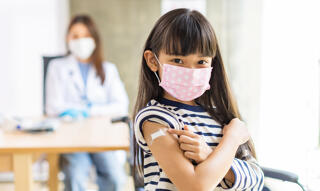Long term
Vaccine recommendations for children in Thailand
As an expat, it is essential to be well-informed about the necessary requirements before settling into a new country. If you're moving to Thailand with children, one of the first things you need to research is the recommended vaccines your children will need, particularly if they will be attending school. This can be a confusing topic, considering the different vaccine schedules and requirements across various countries.

By taking the necessary precautions and ensuring that your child is up-to-date on their vaccinations, you can give them the best possible start to their new life in Thailand.
Childhood EPI vaccination schedule in Thailand
The Childhood EPI (Expanded Program on Immunisation) Vaccination Schedule in Thailand is a comprehensive vaccination program that aims to protect children against vaccine-preventable diseases. The Ministry of Public Health implements the program and is free of cost for all children in Thailand.
Since 2005, the National Immunization Program (NIP) has consistently immunised Thai children with a coverage rate of 96-99%.
Schedule | Vaccine |
|---|---|
Newborn |
|
1 month |
|
2 months |
|
4 months |
|
6 months |
|
9 – 12 months |
|
>12 months |
|
18 months |
|
2-2.5 years |
|
4-6 years |
|
11-12 years |
|
For pediatrician consultation |
|
In the event that parents refuse to provide their consent for their child's vaccination, healthcare workers follow up with parents, explaining the benefits and risks. The child can still attend school if the parents persist, as Thailand has no law requiring full immunisation for school attendance.
Learn more about the vaccines
Hepatitis B vaccine (HepB)
The HepB injection is a crucial and effective measure in providing long-term immunity against hepatitis B infection. Infants who receive the HepB series can expect to be protected from the infection throughout their adult years, significantly reducing the risk of developing severe liver conditions, such as liver cirrhosis, chronic liver disease, and liver cancer.
Diphtheria, tetanus, and pertussis vaccine (DTP)
This combination vaccine protects against three diseases: diphtheria, tetanus, and pertussis—also known as “whooping cough”.
Diphtheria is a bacterial infection that can cause difficulty breathing, heart failure, and paralysis.
Tetanus is a bacterial infection that can cause muscle stiffness and painful muscle spasms.
Pertussis is a highly contagious respiratory infection that can cause severe coughing fits.
Oral poliovirus (OPV) & inactivated polio vaccine (IPV)
Polio is caused by a virus and can spread from person to person through contaminated food, water or air. The virus enters the body through the mouth and multiplies in the intestines. It then spreads to the bloodstream and infects other organs, which can cause paralysis and death.
Oral poliovirus (OPV) and Inactivated Polio Vaccine (IPV) are two types of vaccines that protect against polio. OPV is an oral vaccine that is administered as drops or a piece of candy and can be used to vaccinate children. Because it contains a live virus, OPV should not be given to people who are immunocompromised or pregnant. IPV is a vaccine that is administered as a shot and can be used to vaccinate adults, adolescents, and children over one year old who have not yet been vaccinated.
Measles, mumps, and rubella vaccine (MMR)
The MMR vaccine is the best way to prevent measles, mumps, and rubella. It's a combination vaccine that is usually given to children when they are between 12 months and 15 months old.
Measles is a highly contagious virus that causes fever, red eyes, cough, runny nose, and rash all over the body and inside the mouth.
Mumps is another highly infectious virus that causes fever, headache, neck stiffness and swollen glands under the ears.
Rubella is also known as “German measles” because it causes a rash on the face and neck. However, if a pregnant woman catches rubella during her first trimester she is at risk of having a miscarriage or stillbirth.
Japanese B encephalitis vaccine (JEV)
Japanese encephalitis is a mosquito-transmitted illness that can lead to encephalitis, meningitis, and death within a week of infection.
Most people who are affected by this disease are young children, who are at the highest risk because they live in rural areas where mosquitoes often bite multiple people and spread infection.
Rotavirus vaccine (Rota)
The rotavirus is a virus that can cause diarrhea, vomiting, and fever in children. It can be very serious in babies less than 6 months old, but it’s also possible for older kids to get sick from the virus. It can lead to severe dehydration and even death.

In Thailand, following the vaccine schedule and ensuring that children receive all recommended vaccines is of utmost importance. Despite some parents feeling hesitant about vaccinating their children, the benefits of vaccines far outweigh any potential risks.
Vaccines are scientifically proven safe and effective in preventing diseases and can safeguard individuals who cannot be vaccinated due to medical reasons. Thus, it not only safeguards their health but also benefits the community by promoting overall well-being.
With MyHEALTH, you can ensure your children receive the vaccinations they need to stay healthy in Thailand. Our healthcare plan offers unparalleled flexibility, allowing you to personalise your coverage to fit your specific needs and budget. Choose from a range of options and customise your plan for each family member. Get a quote today!
This article is for informational or educational purposes only, and does not substitute professional medical advice or consultations with healthcare professionals.
Learn more
- Asia-Pacific
Health Insurance in Thailand
- Long-Term International Health Insurance03/2022
Countries looking to welcome expats
Are you planning to live and work abroad? You should know that many countries are actively looking for qualified expatriates! To cope with the lack of labour in certain fields, or to revitalise their national economy after the health crisis...
- Long-Term International Health Insurance01/2023
The best countries for expatriation in Asia
In many ways, Asia is one of the most exciting regions to live and work in. It's home to some of the world's most dynamic economies, and its rapid growth offers opportunities that are just as enticing as they are plentiful...
- Long-Term International Health Insurance09/2021
Thailand Expat Health Insurance for Young Families
Are you an expat in Thailand planning to start or grow your family? Raising young children is very exciting and rewarding, but it can also be very demanding—and sometimes costly…

